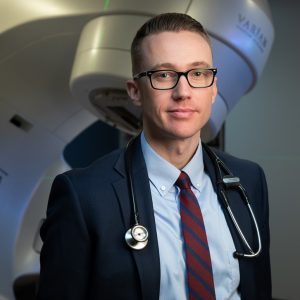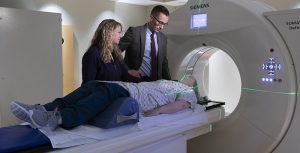
Dr. Jeffrey Brower, an alumnus from the UF/IFAS College of Agricultural and Life Sciences (CALS), is a medical doctor who joined the New Hampshire offices of Radiation Oncology Associates in 2017. In his role, Dr. Brower treats most solid cancers and provides specialty care for patients with gynecological malignancies. As a triple Gator, Dr. Brower earned his Bachelor of Science with a major in microbiology and cell science in 2004, Ph.D. in molecular biology from the College of Medicine in 2008, and M.D. from the College of Medicine in 2012.
While earning his Ph.D. prior to medical school, Dr. Brower’s research led to the discovery of a novel gene responsible for cellular respiration and energy metabolism. After medical school, Dr. Brower became chief resident in radiation oncology at the University of Wisconsin.
Dr. Brower was honored as an outstanding young alumnus from the University of Florida in 2019. The award recognizes alumni under the age of 40 whose achievements positively reflect The Gator Nation. In an interview with Dr. Brower, he shared how he followed his love for learning and desire to care for others, which led him to his current occupation.
- What first sparked your interest in medicine?
My interest in medicine has been present from a young age, mostly in the form of scientific inquiry. I do not come from a family of physicians or scientifically oriented people, but from a very young age expressed an interest in science. The decision to pursue a career in medicine came only after I had begun my Ph.D. work, when I realized I had a desire to directly interact with patients and use my scientific interests to better patient care. Interestingly, the UF Trauma flight helicopter flying over me on a daily basis while on campus was a significant contributing factor to my interest in pursuing medicine. Seeing and hearing the trauma flight helicopter daily inspired me to help others, specifically in their worst moments in life.
- What brought you to CALS and the UF/IFAS microbiology and cell science department?
When I was younger, my parents would take me to the public library after school and I developed an interest in reading about scientific topics. I can remember the first microbiology text I came across and being amazed by the unseen world around us. This led in part to my pursuing a Ph.D. in molecular biology and investigating the unknown in the molecular world.
- How did your microbiology and cell science major prepare you for your career as a doctor?
My major in microbiology and cell science prepared me well for medicine. The courses that were required for the major provided me with a strong foundation upon which to build my medical knowledge. Much of what I learned in those years allowed me to stand out both as a Ph.D. student in molecular biology as well as a medical student in the classroom and on the wards. I can still remember being asked a question by a pediatric infectious disease specialist about a patient with a complicated infectious illness and giving him a correct answer. He was surprised with my knowledge of microbiology, which I learned as an undergraduate.
- What do you feel has been your most impactful contribution to others?
 The most impactful contribution I have likely made to others I would say is through the care I provide for my cancer patients. The gratitude patients, and their families at times, express for either palliating pain, curing their disease or explaining to them the unfortunate inevitability of their disease and helping to comfort them during their transition to hospice has been very fulfilling. This is also the most rewarding part of what I do. Being part of a multidisciplinary team responsible for curing someone’s cancer and giving them back the freedom from their diagnosis is something I never thought I would have the opportunity to participate in during my life.
The most impactful contribution I have likely made to others I would say is through the care I provide for my cancer patients. The gratitude patients, and their families at times, express for either palliating pain, curing their disease or explaining to them the unfortunate inevitability of their disease and helping to comfort them during their transition to hospice has been very fulfilling. This is also the most rewarding part of what I do. Being part of a multidisciplinary team responsible for curing someone’s cancer and giving them back the freedom from their diagnosis is something I never thought I would have the opportunity to participate in during my life.
- What are your goals for the future?
My goals for the future are to improve the quality of community medical care. Unfortunately, there are a number of areas where community medicine lags behind academic medicine, and patients at times suffer as a result. I also hope to continue to participate in the education of residents and improve resident training in order to optimize the skill sets with which residents will be able to transition to independent clinical practice and have a positive impact on the delivery of oncology patient care. I have recently taken on an adjunct clinical professorship at the University of Wisconsin in order to continue to interface with residents in order to provide them with lectures and guide research projects, to this end of bettering resident education.
- What is your best piece of advice for current or future students who may have similar ambitions as you do?
The greatest advice I have for those with similar aspirations is to always keep pushing for the top. There will be times you may doubt your ability to have an impact or make it through the many stages of life required to achieve your goals. An unwavering resolve is critical for distinguishing yourself. Always go above and beyond, and not because someone is watching, but because it is the right thing. Carry yourself with respect and confidence and dedicate yourself 100% to all that you do. Always make sure to take time for yourself and do things that make you happy, as a good balance is crucial for maintaining the stamina required to get to the “top.”
- What does the UF “40 Gators Under 40” honor mean for you?
It is a special honor to have been awarded the “40 Gators Under 40” from the University of Florida. I have been inspired by the possibilities which attending UF afforded me from the moment I first stepped on campus. I can remember worrying about whether or not I would adequately capitalize on these opportunities and am very thankful today to be recognized by this extraordinary university for my achievements.
The study of small living organisms, microbiology and cell science includes emphasis on molecular biology and genetics; immunology; virology; host-pathogen interactions; cellular ultrastructure; environmental microbiology; and microbial physiology, metabolism, and regulation. Students study chemistry, physics, bacterial pathogens, and genetics. Learn more about this major on the microbiology and cell science department website, and learn more about all 23 majors in the College of Agricultural and Life Sciences on the CALS website.
 0
0
